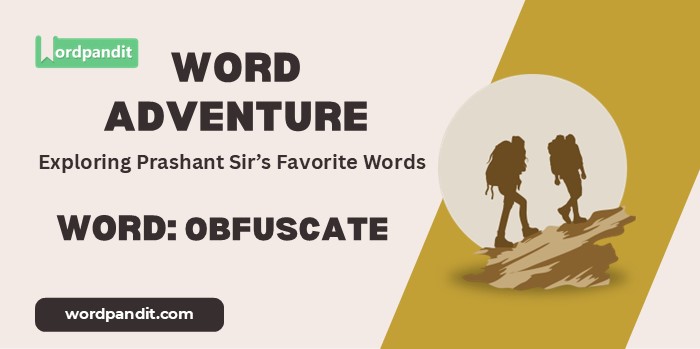Word Adventure: Obfuscate
The Headline
“Obfuscate: The Art of Making Clear Things Cloudy”
The Scoop
In the vast vocabulary of English, some words seem to embody their own meanings. ‘Obfuscate’ is one such delightfully self-referential term – a word that describes the act of making things unclear, while itself often causing confusion for those encountering it for the first time. Let’s clear away the fog and understand this fascinating word that’s all about creating confusion.
Let’s Break It Down
The Plot Thickens
‘Obfuscate’ entered English in the 16th century, during a time when scholarly writing often prioritized complexity over clarity. The word itself reflects this tendency, being more elaborate than simpler alternatives like ‘confuse’ or ‘muddle’.
Interestingly, while obfuscation is often viewed negatively, it can serve legitimate purposes. In computer programming, for instance, code obfuscation is a technique used to protect intellectual property by making the code harder to understand while maintaining its functionality.
The word has found particular relevance in our modern era of information overload, where the ability to recognize and cut through obfuscation has become an essential skill.
Word in the Wild
The Twist
Here’s a fascinating paradox: while obfuscation is typically associated with making things harder to understand, research in cognitive science suggests that a certain degree of complexity or obscurity can actually enhance learning and memory. When our brains have to work a bit harder to process information, we often retain it better – a phenomenon known as “desirable difficulty.” Perhaps there’s a time and place for strategic obfuscation after all!
Make It Stick
Obfuscate: When clarity takes a coffee break and confusion clocks in!
Your Turn
Think about times when you’ve encountered deliberate obfuscation – perhaps in legal documents, technical manuals, or academic writing. Was the complexity justified? How did you cut through the confusion? Share your experiences with obfuscation in the comments below. Let’s explore when clarity trumps complexity and vice versa!
Down the Rabbit Hole
- Curious about similar words? Explore ‘obscure’, ‘mystify’, or ‘becloud’.
- Interested in the psychology of confusion? Research ‘cognitive load’, ‘processing fluency’, or ‘desirable difficulty’.
- Want to learn about strategic unclear communication? Look into ‘diplomatic language’, ‘corporate jargon’, or ‘doublespeak’.
The Last Word
As we conclude our exploration of ‘obfuscate’, I hope we’ve managed to clarify this word about unclear things! It reminds us that sometimes complexity serves a purpose, but clear communication often requires recognizing and cutting through unnecessary obscurity. The next time you encounter something deliberately unclear, remember – it’s not just confusing, it’s obfuscated! Until our next word adventure, this is Prashant from Wordpandit, encouraging you to embrace clarity while appreciating the occasional strategic fog!














